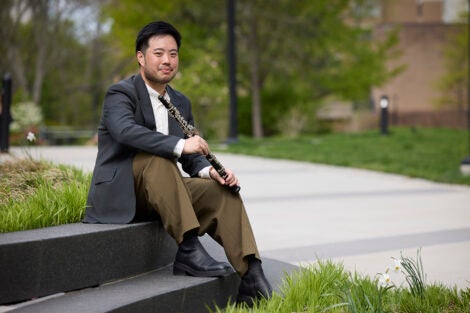Matt Lee, PhD ’24, balanced his academic work studying the links between diet and population health with a side gig playing with a local orchestra.
May 20, 2024 — Matt Lee first started thinking seriously about food policy as an undergraduate volunteer at the University of California, Berkeley’s student-run Suitcase Clinic, where he helped procure unsold food from farmers’ markets to turn into free meals for low-income community members. While the work was important for improving the diets and food security of individual clients, it left Lee, a public health major, wanting to learn more about ways to address nutrition at a broader population level.
His search ultimately led him to study public health nutrition at Harvard T.H. Chan School of Public Health, focusing on topics including the cost-effectiveness of nutrition policies, diet quality during the COVID-19 pandemic, and the health impacts of sugar-sweetened beverage (SSB) excise taxes. This month Lee graduates with a PhD in Population Health Sciences from the Harvard Kenneth C. Griffin School of Arts and Sciences.
A problem solver
As a kid growing up in the Sacramento, California area, Lee thought he wanted to be a doctor. But several work experiences in college shadowing physicians made him realize that clinical medicine wouldn’t be a good fit. “Problem solving was the aspect of science I really enjoyed, and I could find that in public health research.”
For his PhD dissertation, Lee looked at different mechanisms for improving diet, population health, and health equity in the U.S. In the first of three papers he co-authored based on his research, he found that following the enactment of Philadelphia’s 2017 SSB tax, which added a tax of $0.015 cents per ounce on SSBs and artificially sweetened drinks, beverage advertising increased at small, independent markets in low-income neighborhoods in the area. As a result, some of the tax’s effect on purchasing behaviors may have been dampened. The findings suggest that simply passing an SSB tax isn’t enough to dissuade people from buying unhealthy drinks, Lee said. Additional regulations may be needed, particularly around advertising aimed at children.
Lee’s other two papers, which have not yet been published, examined links between adherence to U.S. dietary guidelines and changes in BMI among kids in the Growing Up Today Study, one of the School’s large study cohorts; and compared the diets of Chelsea, Mass., residents who received $400 monthly payments during the pandemic with those who didn’t.
The Chelsea study delves into an area not common in nutrition studies: universal basic income—a type of social welfare program in which people are given a set amount of unrestricted money on a regular basis by the government. These programs are not typically targeted at addressing nutrition or food security, but evidence suggests that they can provide benefits, Lee said. He added, “It would be interesting to see if there are other policies that we don’t typically conceive of as health programs that have impact on health.”
Collaboration across disciplines
The chance to explore research questions beyond departmental silos was one of the reasons why Lee came to Harvard Chan School. “I knew I’d have opportunities to do research collaboratively across disciplines, because people here are connected to other departments in such a seamless way,” he said, noting that he’s been able to tap into expertise in social and behavioral sciences and biostatistics, and also incorporate tools from policy analysis and economics into his work through partnerships with the Kennedy School.
“Matt combines a creative and brilliant mind with a deep commitment to improving public health and addressing injustice, and a unique ability to knit together interdisciplinary approaches to using science to solve some of society’s biggest public health challenges,” said his advisor Erica Kenney, assistant professor of public health nutrition. “Not only has he led some truly innovative studies of how policies impact diet quality, cardiometabolic health, and social inequities, he’s also helped to teach and mentor other students, taking a really kind and collaborative approach to his work.”
Lee’s coming away from his experience at the School with a love for teaching and mentoring, he said. In Kenney, he observed a scientist who cares deeply about her mentees and thinks about how to train the next generation of researchers. He’s come to see that “your identity as a scientist is not just your research, but also what you bring to the table—your experiences, perspectives, and how you view the world.”
For Lee, one way of finding balance has long been through music. He’s a classical oboe and English horn player, and performed in the Longwood Symphony Orchestra while earning his degree. “I do a lot of staring at a computer screen, crunching numbers and analyzing data,” he said. “Music exercises a very different part of my brain. It’s a way to feel a little bit freer and more intuitive.”
After graduation, Lee will be back at Harvard Chan School as a postdoctoral researcher, working with Rita Hamad, assistant professor of social and behavioral sciences, on the links between social policies and cardiometabolic health. After that, he said he hopes to continue pursuing a career in nutrition research, either in academia or another setting.
Photo: Kent Dayton
